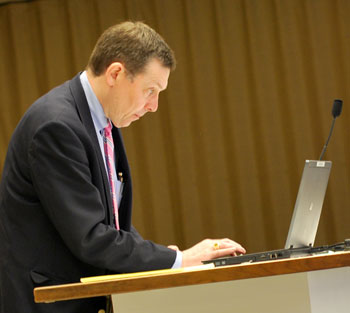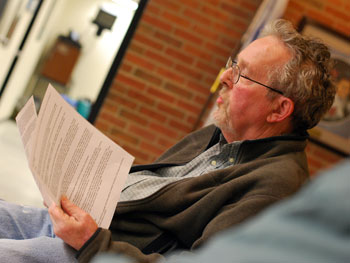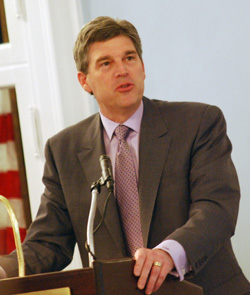Last Monday night, the Ann Arbor city council held its fifth and possibly final meeting devoted exclusively to the city’s financial planning, before it adopts the city’s FY 2011 budget on May 17, 2010. The budget will be formally presented to the city council by city administrator Roger Fraser at its Monday, April 19 meeting.

Stephen Rapundalo (Ward 2) sets up his presentation on the Local Development Finance Authority (LDFA) before the start of the April 12 council budget meeting. Rapundalo sits on the LDFA board as the Ann Arbor city council’s representative, and currently chairs the board.
At the April 12 budget meeting, the council heard presentations on two related entities: the Local Development Finance Authority (LDFA) and Ann Arbor SPARK. The LDFA contracts with Ann Arbor SPARK for various business development services.
The two key themes that emerged from the LDFA presentation were consistent with the overall topic of the city’s budget: (i) Where does the LDFA get its money? and (ii) What does the LDFA spend its money on?
Part of the LDFA’s revenue goes towards economic development activities – a business accelerator – for which it contracts with Ann Arbor SPARK. The presentation to the council from SPARK’s CEO, Michael Finney, was followed by testimonials of companies who said they had benefited from SPARK’s efforts.
Development activities are just one kind of investment that the LDFA could make under its TIF (tax-increment financing) plan. It could also make investments in physical infrastructure. During question time, Sandi Smith (Ward 1) drew out from Stephen Rapundalo (Ward 2) the possibility that the LDFA could contemplate an investment in a fiber-optic network. Rapundalo, who serves on the LDFA board, indicated that such an LDFA investment might be possible, even if Google does not select Ann Arbor as a test community for its current fiber-optic initiative.
The council also heard from the economic development community about how the name “Ann Arbor” is perceived in the rest of the world.
The part of the council’s meeting dedicated to deliberations on its own budget was comparatively brief. Councilmembers were keen to portray in a positive light a couple of different issues, among them a potential increase in the city’s debt load resulting from a failure to complete a $3 million sale of property at First & Washington, as well as proposed increases in water rates. [Full Story]








